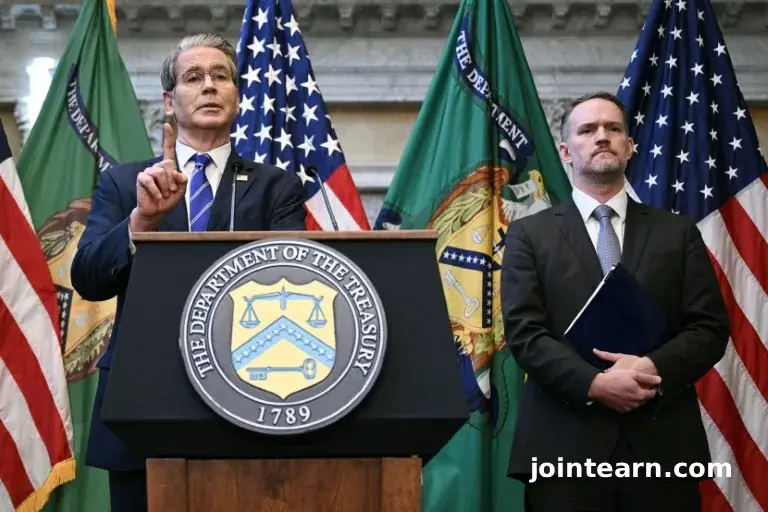
In a bold warning to global markets, U.S. Treasury Secretary Scott Bessent declared on Wednesday that China’s new rare earth export restrictions mark a “China versus the world” moment — intensifying fears of renewed disruption to critical mineral supply chains that power the global economy.
Speaking in Washington during the IMF and World Bank annual meetings, Bessent accused Beijing of using its dominance in the rare earth industry to manipulate global markets, calling on U.S. allies to unite against what he described as “economic coercion disguised as regulation.”
“We will neither be commanded nor controlled,” Bessent said. “This is a wake-up call for every democracy that depends on open, reliable trade. We must work together — and work together we will.”
🌍 The Global Stakes: Rare Earths and Strategic Power
China currently produces nearly 70% of the world’s rare earth minerals — essential for manufacturing electric vehicles, fighter jets, smartphones, semiconductors, and renewable energy components. The new restrictions, announced this week, tighten exports of rare earth technologies and magnetic materials, threatening to upend industries from Silicon Valley to Stuttgart.
Bessent emphasized that the U.S. and its allies must “de-risk and diversify supply chains away from China as quickly as possible.” He confirmed that Washington is already in talks with Europe, Australia, Canada, Japan, and India to coordinate a global response.
“This should be a clear sign to our allies that Beijing’s tactics affect everyone — not just the United States,” Bessent said. “We’re building a fulsome, coordinated response.”
⚖️ A Renewed U.S.-China Trade Clash
The rare earth curbs have reignited the U.S.-China trade war, which flared again during President Donald Trump’s second term. Both sides had maintained a fragile truce, with reduced tariffs and limited trade in sensitive materials. However, that peace appears to be unraveling.
Under the new developments, Trump has threatened to impose an additional 100% tariff on Chinese imports beginning November 1, unless Beijing delays or withdraws its rare earth export controls.
“This is not just about the United States,” said U.S. Trade Representative Jamieson Greer. “China’s move is a global supply chain power grab — an act of economic coercion against every country that relies on these critical materials.”
Greer added that Washington is preparing retaliatory measures, including potential export restrictions on advanced U.S. technologies and tariff hikes if Beijing proceeds.
🔁 Talks, Tariffs, and a Possible Truce Extension
Despite the sharp rhetoric, Bessent left the door open to diplomatic resolution, suggesting a possible extension of the tariff truce in exchange for a freeze on China’s new controls.
“Could we go for a longer pause on tariffs in return for a delay? Perhaps,” Bessent said. “That’s what we’ll negotiate in the coming weeks before the leaders meet in South Korea.”
Trump and Chinese President Xi Jinping are expected to meet at the upcoming Asia-Pacific Economic Cooperation (APEC) summit, where trade and rare earths will dominate the agenda.
Bessent confirmed that “the president still intends to meet Xi” — signaling a last chance to stabilize the relationship.
⚠️ Economic Impact: Supply Chain Disruption Looms
Analysts warn that if the restrictions take effect, industries reliant on rare earths — from electric vehicle manufacturers like Tesla and BYD to defense contractors such as Lockheed Martin — could face production delays and higher costs.
The move has already rattled investors, driving volatility in commodities markets and prompting concerns of a “rare earth shock” similar to the one that disrupted global manufacturing in 2010 when Beijing briefly halted exports to Japan.
Economist Dr. Maya Ranganathan from Georgetown University noted:
“China is using its dominance in critical minerals as leverage. This is not just a trade dispute — it’s a geopolitical maneuver that could reshape industrial supply chains worldwide.”
🤝 The Allied Response: G7 and Beyond
Bessent said Washington will rally its partners in Europe, the Indo-Pacific, and North America to form a unified strategy.
This includes expanded cooperation under the G7 framework, as well as outreach to emerging democracies that depend on rare earth imports.
“We are already in active discussions with the EU, Japan, Australia, and India,” Bessent confirmed. “This isn’t a bilateral issue anymore — it’s China versus the world.”
In parallel, several countries are accelerating rare earth projects to reduce dependence on China. Australia’s Lynas Rare Earths, Canada’s Vital Metals, and U.S.-based MP Materials have all announced expansions, backed by government incentives under critical minerals security initiatives.
🧭 What Comes Next: Decoupling or Diplomacy?
While Bessent and Greer insisted they prefer dialogue over decoupling, they made clear that Washington is ready to act if Beijing proves “unreliable.”
“If China wants to be an unreliable partner, then the world will decouple,” Bessent said, echoing remarks made earlier in the week.
“We will defend our industries, our security, and our allies — but we’d rather not have to.”
As of mid-October, both sides continue high-level negotiations on the sidelines of the IMF meetings. The outcome could determine whether the U.S.-China relationship stabilizes — or slides back into full-scale economic confrontation.


Leave a Reply